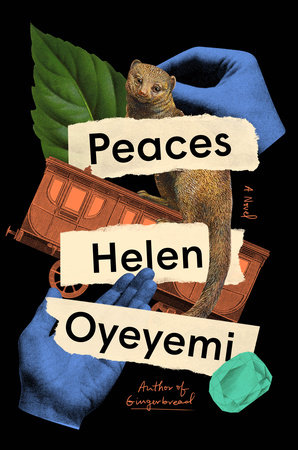Ordinarily I would start a review by describing the book’s premise, but Helen Oyeyemi’s Peaces, like so many of her books, resists the idea of a “premise.” As time goes on and Helen Oyeyemi approaches a Helen Oyeyemi singularity, it becomes harder and harder to encapsulate her books into anything as mundane as a “premise.” There is a train; some newlyweds and their pet mongoose are traveling on the train; things go a bit wrong. Former Oyeyemi premises include: A male author writes a lot of female deaths; things go a bit wrong. Twins live in a haunted house; things go a bit wrong. An immigrant woman makes a special kind of gingerbread; things go a bit wrong. You know! The classics!
 Like most/all of Oyeyemi’s work, Peaces has the cadence and tenor of a fairytale. We are introduced to characters, certainly: Otto and Xavier Shin, who have received as a not-wedding gift this train journey; their mongoose, Arpad; the train’s proprietor, Ava, and her protectors, Laura and Allegra, and her mongoose, Chela. But the standard book questions like “why are these characters the way they are?” and “what motivates their choices?” are not questions that appear to interest Helen Oyeyemi. Instead, her stories ask fairy tale questions along the lines of “Can we ever awaken from the dream that is reality?” and “Do we even want to?”
Like most/all of Oyeyemi’s work, Peaces has the cadence and tenor of a fairytale. We are introduced to characters, certainly: Otto and Xavier Shin, who have received as a not-wedding gift this train journey; their mongoose, Arpad; the train’s proprietor, Ava, and her protectors, Laura and Allegra, and her mongoose, Chela. But the standard book questions like “why are these characters the way they are?” and “what motivates their choices?” are not questions that appear to interest Helen Oyeyemi. Instead, her stories ask fairy tale questions along the lines of “Can we ever awaken from the dream that is reality?” and “Do we even want to?”
Peaces begins with a matter-of-fact weirdness that put me in mind of Susanna Clarke, particularly her newest (!) novel, Piranesi. At first the weirdness is charming and sweet, along the lines of the fact that Otto Shin has a pet mongoose named Arpad, and Arpad is the latest descendant of a series of family mongooses, also named Arpad. Charming! Sweet! The book gives the impression that the world is just like this, and we won’t get anywhere by making a fuss about it, so we might as well get on with it. But of course, this isn’t our, the reader’s, world. But it’s all so matter-of-fact, the way Helen Oyeyemi writes it, that you start to wonder if maybe this is the world and we’ve just been mistaken about it all along.
But then! It gets so creepy! Peaces goes on a journey from “this is weird but fine” to “this is a bit creepy actually” to me curled up in my comfy armchair in my comfy library whisper-screaming AAAAAAAAAA. I admit that the closing creepiness is of a type that causes me a particular terror: When listening to The Magnus Archives, my true most terrifying of the fears was The Slaughter, but The Stranger was a close second. Peaces pings pretty close to several of the Fears/Entities, in case that is your jam.
Ever since Boy Snow Bird, I have been an anxious detective of whether Helen Oyeyemi hates trans people. (The ending of Boy Snow Bird, in case you have forgotten it, has a trans character who’s trans due to trauma, and the narrative suggests that he needs to be saved from his trans-ness.) Peaces contains a new clue!
The romantic failures are a sore spot. That’s a field in which I really ought not underwhelm. When Martha and Lieselotte had me, Martha’s legal name was still Mark, and Lieselotte was a high court judge in Bern. They’re two of the freest people I know, and somehow that seems like a by-product of the rambling conversation they’ve been in ever since they met, an exchange that draws them down by-lanes of trivia and scholarship, pettiness and poetry. When some new pact clicks into place, they meet at its corner to kiss. My professor mum made her Martha-ness official, and my Bern high court judge mum stepped down and stripped her view of justice all the way down to grass roots, serving her god (and I really do think justice is a god for Lieselotte) as a police inspector who does her paperwork whilst sipping coffee out of a mug emblazoned with a picture of her wife and son. I hate that mug. The picture on it makes us look like IKEA models who might just get thrown in as freebies if you buy enough furniture. But catalog elements aside, it’s a photo in which Martha is full-on sultry professor, and I look like a cute baby Viking. So even if her current mug gets broken, or hidden, Lieselotte just pulls out another, identical one.
Pros: Clear affirmation of the trans person’s identity. Cons: Unnecessary use of deadname. Conclusion: I don’t think she hates trans people, but this is still a clumsy and ignorant way to speak about a trans woman. So…. much better than Boy Snow Bird? But still not the best.
Note: I received this book from the publisher for review consideration. This has not impacted my review.